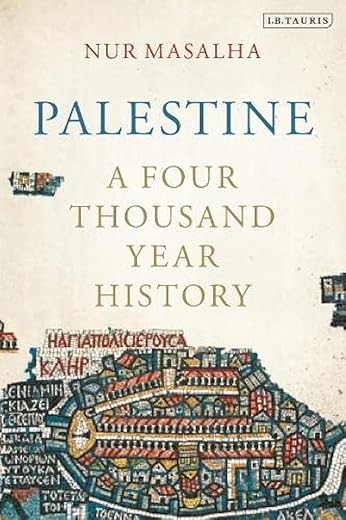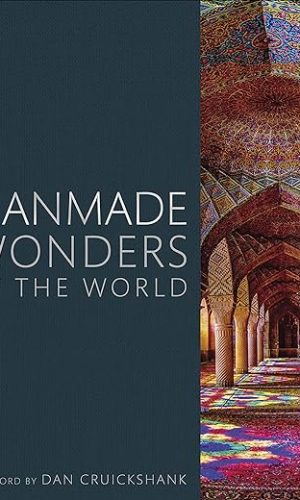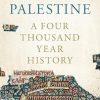Palestine: A Four Thousand Year History
£10.40
Starting with the earliest references in Egyptian and Assyrian texts, Nur Masalha explores how Palestine and its Palestinian identity have evolved over thousands of years, from the Bronze Age to the present day. Drawing on a rich body of sources and the latest archaeological evidence, Masalha shows how Palestine’s multicultural past has been distorted and mythologised by Biblical lore and the Israel–Palestinian conflict.
In the process, Masalha reveals that the concept of Palestine, contrary to accepted belief, is not a modern invention or one constructed in opposition to Israel, but rooted firmly in ancient past. Palestine represents the authoritative account of the country’s history.
Read more
Additional information
| Publisher | I.B. Tauris (25 Aug. 2022) |
|---|---|
| Language | English |
| Paperback | 458 pages |
| ISBN-10 | 0755649427 |
| ISBN-13 | 978-0755649426 |
| Dimensions | 15.62 x 3.05 x 23.24 cm |










by Mo Brown
Very valuable historical information.. well written.
by Germinal
Nur Masalha has written an excellent historical corrective of the land of Palestine. The correction derives merely from calling the land Palestine. The fact that this seems like a shock is indicative of the dominant narrative of the history of Palestine which tends to exclude the name Palestine and the name of the indigenous people of Palestine, the Palestinians.
As with most works of history there are strengths and weaknesses. The strength here derives from Masalha’s method and approach of looking at history from the bottom up rather than as a history of dynasties and empires.
Masalha is particularly strong in his treatment of late Antique/Byzantine Palestine onwards. He establishes that when the Romans named their new province as Syria-Palestina they were standing on firm local traditions and that everyone inside and outside the province had no problem with its name. Maslaha describes a local Byzantine Arab culture developing from about 300 CE, the following adoption of Byzantine forms by the Islamic empire and its term of Jund Filastin for the land, through the Crusade period, Ayyubid and Mamluk periods, all generally peaceful and prosperous with a continued identification of the land as Palestine, into the Ottoman period where local tradition and later Ottoman practice treats the land as Palestine, showing how Palestine became an early exporter of produce into the British industrial revolution from the mid 18th century onwards with the later part of that century seeing a de-facto independent state governing most of Palestine and through into the 19th century where increased interest by European Biblical scholars and later Jewish immigrants all identify the land as Palestine and where the people who live identify themselves as belonging to that land and that they are Palestinians. There has been a claim, made by Zionist colonisers, that the land was not known as Palestine throughout history and this view is rendered unsustainable.
As expected, Maslha is especially strong on the 20th century and the racist endeavour of establishing the state of Israel in the land of Palestine and the re-writing of geographical names from Arabic to modern Hebrew – even to the extent of erasing names acknowledging Jewish heritage – in a process of de-Arabisation.
Much weaker is the early part of the book which deals with ancient history. This is clearly a field in which Masalha doesn’t feel comfortable and it shows in the text with what looks like notes simply transferred into the text of the book with constant repetitions. He needed help from a classical historian and a decent editor.
And for a book that spends so much time discussing geography and referring to maps in the text, one would expect some maps and illustrations – bizarrely, there are none.
Nevertheless, Masalha establishes that the land was consistently generically known as Palestine, or variants thereof, from about 1,200 BCE and certainly from 550 BCE when Herodotus visited. So there is a clear and convincing case that Palestine has been known as Palestine for the best part of 3,200 years – and by that we mean all of Mandatory Palestine plus some areas to the East of the Jordan valley, with some variation over time.
What Masalha has not done is include the history of the Hebrew states of Omri or of Judah and their history, nor of the Hasmoneans nor the Jewish revolts against Rome, nor of the founding of the Jewish or Christian religions. I think he should have done this – these took place in the land that was called Palestine and should be seen as Palestinian history. I understand why he hasn’t done so – because too frequently those events are treated as THE history of that land and the history that Masalha has written is silenced.
It is, perhaps, instructive of the silencing of Palestinian history and of the history of Palestine that, some three weeks after publishing, that no mainstream media source has reviewed this book, whereas history books published since this one have been,
by JHFD
I must start by saying I wish I had knowledge of the truth, without it we can only ever have opinions, the value of which must be subjective.
I found this book a fascinating listen; I am not knowledgeable on the subjects discussed and consequentially am not able to say to what extent the book represents a ‘true’ picture as to the history of Palestine. It is, however, a history seen through the eyes of writers, referenced in the text, with view points that are different to those historians with a bias towards western points of view and propaganda, which are so often, for westerns, the sources on which we base our understandings; historians that in the west are more likely to hold sway. My impression of the content is that it is broadly factual, certainly believable and definitely not to be dismissed.
Given the current situation in this area of the middle east, it is enlightening to get these different perspectives on both past history and the present; especially when so much of what we are taught, encouraged to believe, in the west is based, as previously mentioned, on history as seen from the west’s perspective. A history steeped in the culture of the western colonial powers that is increasingly being challenged for its underlying abuses of power and mistreatment of indigenous peoples. Recorded history significantly reflects the beliefs and understandings of the recorder of that history is often biased towards support of the thinking prevailing at the time by the dominant parties involved. Civilisations, colonial powers, countries, peoples and individuals generally want history to portray them in a favourable light and they work hard to achieve this aim.
Israel was finally established in Palestine in 1948. This was some time after the power and influence of the post-industrial revolution European nations had started to decline and after the end of WWII and its associated atrocities. Legacies of colonial power were however still dominant in world affairs and the influences that sought a Jewish state, as discussed in the book, were still to the fore. Decisions were made in the run up to the creation of what was to become Israel by western nations controlling the middle east with little involvement of or regard to the occupants of the region.
The constant emphasis by the western press of the massacre of Jews by Hamas during the 7th of October 2023 uprising and its failure to see subsequent Israeli action in Gaza as the massacre of Palestinians takes on a special significance when viewed in the light of recorded massacres of Palestinians in the lead up to and during the creation of the Israeli state in Palestinian in 1948. A process that still is actively, it would seem, encouraged in the West Bank by the present right wing Israeli government. The behaviour of some Jews in the early days of the colonisation of Palestine, during the subsequent establishment of Israel and in the years following 1947 towards the indigenous Palestine peoples has in many cases been little less than appalling – villages destroyed, people driven off the land and land grabbing by the Jewish settlers; it is still happening. Histories, other than when recording facts (battle of Hastings 1066), are by their very nature subjective and are never representative of the truth in its entirety. The sections in the book detailing the Israeli moves to rewrite the history of their occupation of Palestine are a case in point, as evidenced to a degree by name changing under David Ben-Gurion (David Grün) and the obliteration of once fruitful Palestinian villages.
Peace and Reconciliation must surely be the only way forward with the horrors of the past put to bed.
This book is well worth reading and I would suggest that Western leaders should be included amongst those that read it. I for one am appalled by the West’s apparent total disregard of internationally agreed standards and laws as to how to treat people in times of war and would suggest that such disregard equates to complicity in the crimes now being committed.
by robert
In many ways this is a fascinating and interesting book, but I have to agree with Dr Simon Woodward who reviews the book elsewhere, that it is extremely flawed. It is the worst edited book I have ever read, in fact I wonder if it was edited at all. I say that because as I was reading, I was continually thinking why have you said this? What is the point of all these lists? Why are you continually repeating yourself. I did wonder if it was in fact down to the author, that it was such a poorly written book. If so the editors are still culpable, as they should have seen what was a mess of a book it is, and turned it into a coherent offering. It got so annoying, I thought that when I finished the book, I would write to the publishers to express my dismay and annoyance at the inept editing of the book. One of the most irritating aspects, and it was really irritating, was the elongated lists!! he author did not stop at one or two examples. On page 178 he list , not one, not two Palestinian cities he lists 13!!. This is a habit he continues with throughout this book. why he felt the need to do this, I do not know. One or two examples would be sufficient to get his point across to the reader. It is a pity that all this marred what could have been a very good and interesting book, but in the final analysis, is a poorly constructed one.
by Kindle Customer
Auibles policy has changed they think I am try to cheat them. I resent being accusted of cheating.
by Ursula Pretzlik
The author captures the history of Palestine superbly. A page turner from the beginning to the end. Beautifully carefully researched and presented. A must read!
by Amazon Customer
Genereal knowledge about the history of Palestine